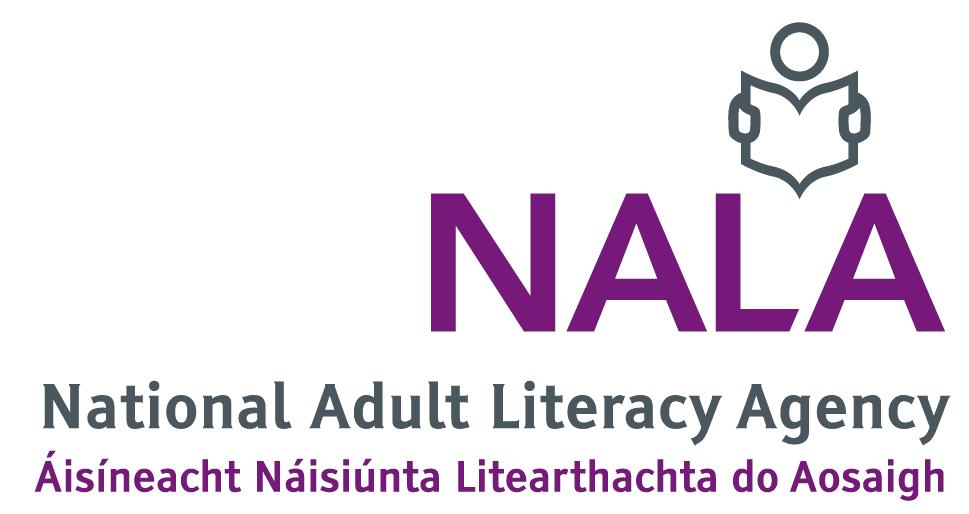
The National Adult Literacy Agency is an independent charity committed to making sure people with literacy and numeracy difficulties can fully take part in society and have access to learning opportunities that meet their needs. According to the last international survey, one in six Irish adults has problems reading and writing.
Since we were set up by volunteers in 1980, we have been a leading campaigning and lobbying force on adult literacy issues. We have been involved with tutor training, developing teaching materials, distance education services, policy making, research and campaigns to raise awareness of the causes, extent and responses to adult literacy difficulties in Ireland.
Many individuals and organisations have contributed considerably to adult literacy work in Ireland. For our part, we have put literacy on the political agenda and secured funding for the provision of adult literacy services. Currently there are 54,000 adults attending ETB adult literacy courses nationwide. This service is delivered by 1,500 paid tutors and over 2,400 volunteers.
Health Literacy
Research shows that 45% of people surveyed do not understand the term prognosis.
17% said they had taken the wrong amount of medication on at least one occasion.
Many people find health information difficult to understand and may be putting their health at risk. Recent European research showed that one in four Irish people find it difficult to read and understand health information, for example, instructions on medicine packs or prescriptions.
New Irish research shows that Irish people want healthcare professionals to use less medical jargon:
- Two in five (39%)Irish people are calling for doctors, nurses and pharmacists to use more understandable language and less medical jargon. This was followed by speaking less formally (22%) and taking more time to explain things (18%).
- 17% of people surveyed said they had taken the wrong amount of medication on at least one occasion.
- People aged 15 – 34 years were least likely to ask a doctor, nurse or pharmacist to explain things they don’t understand.
- Embarrassment was ranked as the main reason for not seeking more information from a healthcare professional (24%).
“Patients who are better informed about their health have more effective consultations with their health care provider, are more likely to comply with their medication and as a result have improved health outcomes,” says Inez Bailey, CEO, National Adult Literacy Agency.
What is health literacy and numeracy?
Health literacy and numeracy involves a person being able to understand basic health information whether they receive it in writing, in person or over the phone. It also involves a person having the knowledge to understand their options and make informed decisions about their own health.
People working in the healthcare sector play an important part in improving health literacy and numeracy by communicating more clearly and making information and services more accessible to patients.
The Crystal Clear Programme
The research was launched to coincide with the launch of the Crystal Clear Pharmacy and General Practice Programme developed by MSD and the National Adult Literacy Agency (NALA). The programme has been developed to recognise the critical role pharmacies and general practices play in helping patients understand their health issues and the steps they need to take to improve their health. A Crystal Clear Mark will be awarded to pharmacies and general practices that take account of the literacy and numeracy needs of their patients and regularly evaluates and consistently improves this. MPHC is one of the first general practice to be awarded the Crystal Clear Mark by NALA.
This programme will support pharmacists and general practitioners to improve their services ensuring important health information is better communicated and understood between health practitioners and their patients. This is an investment in better health outcomes for all people in Ireland.
Tackling health jargon through plain English
One way to avoid sometimes unsatisfactory health consultations is to use plain English in written and verbal information. As its focus is on everyday language, plain English helps to reduce the mystery and anxiety that surround certain health conditions. Shorter sentences, everyday words, a direct and personal tone and well-known images and symbols can contribute to clearer communication to everyone.
What can I do to ensure I understand health information?
Ask me three is a simple set up questions patients should ask of their doctor, nurse or pharmacist during every visit. These questions are:
- What is my main problem?
- What do I need to do?
- Why is it important for me to do this?
Be prepared and ask questions
Sometimes it’s difficult to remember everything you wanted to know or ask your doctor or health care worker. One way to avoid sometimes unsatisfactory health consultations is to be prepared. Write a note of any questions or concerns you have before your appointment so you don’t forget anything important.
And be sure to ask your healthcare provider to explain any complicated language in plain English.
Check your understanding
Often it is useful to check your understanding of what has been said to you by explaining the information back to your healthcare provider. That way they can be sure you understood the discussion and can correct anything you may have misunderstood.
Further information
National Adult Literacy Agency (NALA) www.nala.ie or phone 01 412 7900
